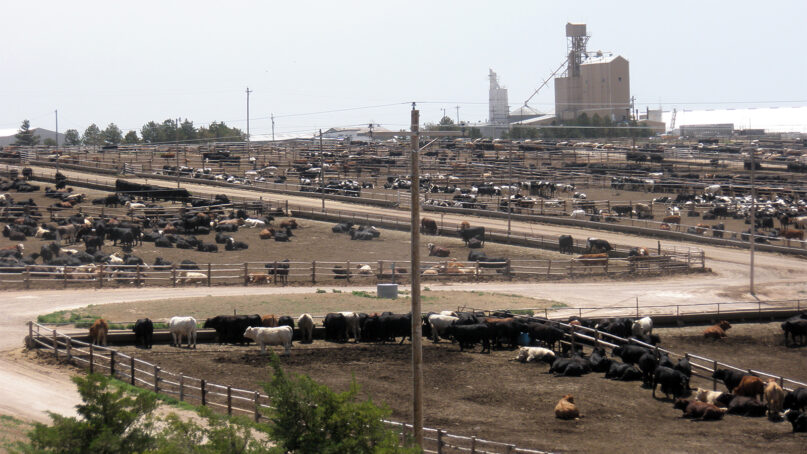(RNS) — One of the most interesting developments in Catholic theology over the past few decades involves a wider and more creative appreciation for the concept of ecology. The rise in prominence of the Institute for Human Ecology at the Catholic University of America, for instance, signals a new appreciation for “the systematic study of human beings in their relationships with one another, with various human communities, and with the natural world shared among all the living organisms on the planet.”
The foundations for this theology were laid by Popes St. John Paul II and Benedict XVI, but no one can deny that Pope Francis has taken the concept of “integral ecology” to new heights in the church, particularly through his great encyclical “Laudato Si’.” In that document, published in 2015, the Holy Father rightly emphasizes that “everything is closely interrelated,” and he reminds us that our environmental crisis is also a social crisis that requires a strategy for restoring the dignity of marginalized human beings as we protect nature.
When we speak of ecosystems, we have to go beyond the idea that we likely learned in school that our physical environment is merely the raw material of God’s creation. Instead, we should see the way that human systems and social structures interact and cause terrible disruption and violence to God’s plan for all of creation.
From global capitalism to immigration to biotechnology and much else besides, human systemic interventions deserve special scrutiny as we attempt to work in harmony with God’s creative plan.
These high-flown theological concepts take concrete shape when we learn, thanks to a U.S. Department of Labor investigation announced earlier this year, that corporate meat producers are exploiting children as workers. Children, the report said, were “handling dangerous equipment like skull splitters and razor sharp bone saws.” Many of these exploited children came through the migrant shelter system, another deeply flawed social structure in the United States.
“Big Meat” tends to exploit immigrant populations more generally, with immigrants making up 73% of its workforce; half of all employees are undocumented. These desperate people, working in horrific conditions, do the disgusting and often violent work of putting cheap meat on our tables — yours and mine. This is a classic example of systemic sins we participate in as a society, and the “throwaway culture” Pope Francis is at pains to warn us about.
If you don’t think a lot about where your meat comes from, it is almost certain that what you eat comes from a “factory farm.” These places have no interest in treating animals as the creatures God created them to be. Instead, they design their facilities to maximize “protein units per square foot.” If that means animals lead a tortured existence, well, so be it. The U.S. consumer demands that they take drastic steps to provide cheap meat.
So what if chickens are bred to grow so quickly that they can’t stand up? So what if middle schoolers work the night shift cleaning skull splitters? Can’t make an omelet without breaking some eggs, amirite? It’s called throwaway culture for a reason.
A Catholic view of the whole of human and integral ecology can see the connections between the sinful social structure of factory farming and the sinful social structure of our lax immigration and child labor laws. It should be wholly unsurprising that, in addition to these connections, factory farms are the most significant contributor to global climate change, a catastrophic threat for humanity. That waste from factory farms produces terrible threats to human water systems and even human drinking water.
Those who carry out the violence of factory farms are doing great harm to themselves as well. Witnessing and perpetrating violence and killing over and over again debilitates the workers themselves and often produces high rates of PTSD.
Factory farms, not least because of their intense use of antibiotics (animals living in such close quarters would otherwise be near-constant and intense vectors of many diseases), are breeding grounds for what are commonly known as “super bugs.” That is, profoundly drug-resistant strains of bacteria that may one day be responsible for another global pandemic.
A Catholic vision of ecology is not just about saying “no” to stuff — refusing to buy meat and other animal products under these conditions of throwaway culture. (Though I believe we should refuse to do so.) If one is going to buy meat and other animal products, one can do so in the spirit of supporting a positive vision of human and integral ecology, right? One that builds a counterculture of encounter and hospitality?
We can search out local purveyors at farmers markets and develop our own relationships with the small family farms. Their products may cost a little more, because they do things the right way. They might not be as efficient and profitable as the corporations that control most food production in the United States, but they are much more likely to treat animals and the broader environment in ways that are consistent with God’s creative and ecological plan.
Workers on small family farms very often have genuine encounters with, and show hospitality to, the animals in their care and have a deep understanding of and respect for their good and flourishing. The animals’ suffering is minimized. There is no need or desire to exploit workers. Such farms have nowhere near the carbon footprint of factory farms. Because animals have sufficient space to live their lives, there is no need to bathe them in antibiotics.
The small farmers who do this right can feel justly proud of their labor. And we can feel good about having an economic relationship with them as well. While not perfect (nothing on this side of the eschaton ever is!), bringing your business to small farmers witnesses to an integral ecology, acknowledging that we are responsible for caring for creation according to God’s plans and desires, not our own.





